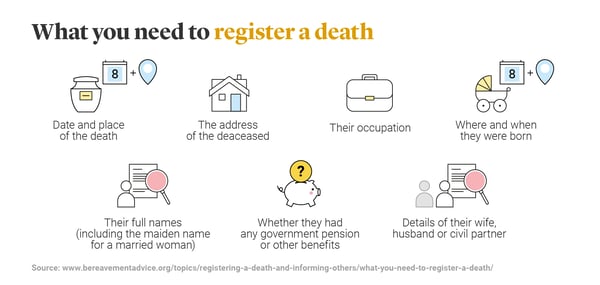How to plan a funeral
There are few events more overwhelming in life than someone close to you passing away. Whilst you’re in mourning, it’s likely you’ll also be organising a funeral and dealing with a lot of paperwork.
It can be a very testing time, which is why we’ve put together this brief guide to offer you a little help on how to arrange a funeral.

Find out more about Over 50 Life Insurance
How long it takes to arrange a funeral
It often takes around two weeks to organise a funeral, but sometimes it can be arranged sooner. Every situation is different, and in some cases, funeral arrangements might be delayed if a coroner wishes to investigate a sudden or suspicious death.
How to plan a funeral in 10 steps
While no two funerals are exactly the same, there are various steps that the family or friends of the deceased are likely to take before a funeral can take place. Here is our ten-step summary for how to organise a funeral and wake.
1. Register the death
You must register a death within five days at a Register Office in England and Wales and with the District Registration Office in Northern Ireland. In Scotland you have eight days to register a death with the Registrar of Births, Deaths and Marriages.
You must take the medical certificate of cause of death (unless the coroner or procurator fiscal has sent it to the registrar directly). If possible, also take important documents belonging to the deceased with you. For example, NHS card, birth certificate, driver license or passport.

2. Check if the deceased wrote a letter of wishes
The deceased may have had very specific requests about the kind of funeral service they would like. These may have been communicated to a friend or family member, be included in a will or other document such as a letter of wishes , or form part of a funeral plan they have in place. It’s best to check for any documentation before making any arrangements.
3. Confirm how the funeral will be paid for
Nowadays, even a modest funeral can cost a tidy sum of money, with the average cost of a UK funeral in 2024 being £4,706, which has risen by £1,090 in the last 10 years. Some people opt for a prepaid funeral plan as a way of financing a funeral, so it’s worth looking into whether the deceased left any details about a funeral plan, such as documents or a policy number.
Alternatively, the deceased may have had a life insurance policy, and the cash sum from a valid claim could be put towards funeral costs. If you’re not sure which insurer to contact, you may be able to find this information on the deceased’s bank statements. You will need a Grant of Probate before you can access funds to pay through the deceased’s estate. However, if the bank account of the deceased has been frozen following the death, a bank, building society or national savings account may release funds to specifically cover the funeral on showing the death certificate and funeral invoice.
4. Choose a Funeral Director
A good Funeral Director can help guide you through much of your funeral planning and will be there to help every step of the way.
If the deceased had a funeral plan, this may have been set up with a named Funeral Director, so it’s best to check before you make an appointment.
If your loved one died in hospital or a care home, you may find they have a list of recommended local Funeral Directors, while many people seek recommendations from friends or relatives. Alternatively, you can find lists of approved Funeral Directors at the National Association of Funeral Directors and the National Society of Allied and Independent Funeral Directors.
5. Book the venue
The deceased may have communicated – verbally or in written instructions – where they would like the funeral to take place. But if not, you will need to select a funeral venue that you think is suitable for the occasion, whether it’s a church, crematorium or green burial site.
6. Choose someone to conduct the service
Once upon a time most funeral services would be taken by the local vicar. Nowadays you have a number of options to choose from for the person now usually called the celebrant – both religious and non-religious:
A minister of religion – they will conduct the service along the lines set out by their particular faith.
Humanist – they will conduct a service with no reference to a supreme being. You can find one through the Humanists UK and read more bout planning a non-religious funeral.
Civil celebrant – will work with the family to create the service and include religious and secular content as required.
A family member or friend – will make for a more personal service, but can be a major undertaking.
7. Organise a wake
After the service, many families like to hold a wake or reception at a local venue or at their home for friends and family to gather and remember the deceased. This can often be a joyous occasion, with people sharing their memories, celebrating the life of the deceased and seeing old friends and relatives. The scale of the reception is up to you, though usually a buffet meal and some drinks are more than enough.
In terms of how to organise a wake, you could contact a venue close to where the funeral is taking place – such as a community hall, sports club or hotel. You will need to estimate the number of guests, then decide whether you want to hire a catering service or offer homemade light refreshments.
8. Think about floral tributes
Many florists will make floral tributes to order for a funeral, from words to an item associated with the deceased. Just talk through what you have in mind with them and see what they think is possible.
9. Consider a charity donation or fundraiser
Many people now like to offer the option of making a charitable donation, perhaps to a charity associated with the deceased, in lieu of sending flowers. Your Funeral Director will usually be able to arrange for this money to be collected on your behalf.
Moreover, you could consider directing friends and family to an online fundraiser, such as a Just Giving page , which invites people to donate money towards a particular cause, act of commemoration, or to contribute funds towards funeral costs.
10. Involve friends and family
There are simpler things in life than knowing how to plan a funeral, but you can make life easier by involving other loved ones in the process. Your friends and family can help with everything from sending out emails to providing transportation on the day.
In terms of the finer details of the funeral itself, it’s a good idea, whether the deceased left any requests or not, to ask what others who were close to them think, so that everyone can feel included in the arrangements.
What does a funeral director do?
As we’ve covered, choosing a funeral director is one of the key steps when organising a funeral. Once you’ve chosen a Funeral Director, they should provide the following services:
- Transporting the body from the place of death to the funeral home and dressing the body.
- Managing and advising on necessary legal documentation.
- Helping you to plan the funeral service, including music, tributes and printing the order of service.
- Advising on a choice of who you’d like to take the service.
- Offering a choice of coffins to suit any budget.
- Providing facilities for viewing the deceased before the funeral.
- Arranging for a hearse and cars to the service.
- Providing pall-bearers.
- Placing death notices in newspapers and online.
- Collecting charitable donations on your behalf.
- Preparing ashes to be scattered or placed in an urn for collection.
How to plan a funeral without a Funeral Director
While the vast majority of people choose to use a Funeral Director, there is no legal requirement to do so. Though remember, while it may save money to do it this way, it will also likely take up much more of your time.
You can buy a coffin direct from many makers, including eco coffins made from wicker, cardboard and handmade from environmentally friendly wood.
You will then need to book a crematorium or arrange a burial yourself, complete with all necessary paperwork. A good source of help and advice is The Natural Death Centre.
Types of funerals: cremation versus burials
If you’re planning a funeral, you will need to arrange a type of funeral based on the wishes of the deceased, or if they didn’t communicate a preference, your own judgement. Here we explain some of the differences between cremations versus burials.
Cremations
Some people opt for a cremation as an alternative to a burial. A cremation is where the deceased’s body is burned to ashes in a crematorium as part of a ceremony of remembrance. A direct cremation is a type of no-frills cremation where there is no formal service, and is often unattended. Here is some key information about cremation services to help you plan a funeral.
- In modern times over 79% of funerals are cremations.
- Necessary paperwork and booking of the crematorium will usually be taken care of by your funeral director.
- A service for friends and family is held before a cremation, often in a chapel at the crematorium, though it can be held anywhere – in a church, at home, a local community centre.
- At the end of the service, the coffin will pass out of sight, into a recess or behind a curtain before cremation takes place later.
- Ashes will be returned to next of kin, via their Funeral Director, along with a Certificate of Cremation.
Burials
Burials have been a traditional way of burying the deceased for centuries. Burials are where the deceased’s body is put into a grave or tomb in the ground, where people can visit in the future and pay their respects. Below is a summary of what to expect from planning a burial funeral:
- With a burial, your Funeral Director should take care of most of the necessary paperwork.
- There is usually a church service before the burial, after which the coffin is carried to the graveside, where after the words of committal, it is lowered into the grave.
- Burial can take place in a churchyard, cemetery, green burial ground or on private land, so long as the right documentation is completed, and there is space available.
- Depending on the rules of the chosen burial site, you may be able to erect a memorial.
- Be aware that in many church sites, the family is responsible for the upkeep of headstones and grave sites, or paying for this service.
Paying for the funeral
Given the high cost of a UK funeral, it’s understandable if any family finds it difficult to raise enough funds following a death, especially when it comes suddenly and unexpectedly.
However, there are things you can do to plan ahead and alleviate the financial worry for your loved ones. As we explore in our guide to saving on funeral costs during a cost of living crisis, money-saving tips include providing your own catering, and doing your research on coffin prices.
Planning your own funeral
In all our lives, at some stage it’s likely we’ll have to think about our own funeral. If you’re worried about the cost or want to leave something behind for loved ones when you die, you could find out more about our Over 50s Fixed Life Insurance. While it may not cover the full cost of the funeral, it can help towards it.
Alternatively, you can add the Funeral Benefit Option to your Over 50's Fixed Life Insurance. At the time of claim, the cash sum is paid directly to Dignity Funerals Limited, and a Dignity Funeral Director will take care of the funeral arrangements for you. Dignity will also contribute £250 towards the funeral costs.
Source
Legal & General Research, 2024.
Find out more about life insurance
Related articles

Funeral costs in the UK

How to pay for your funeral

